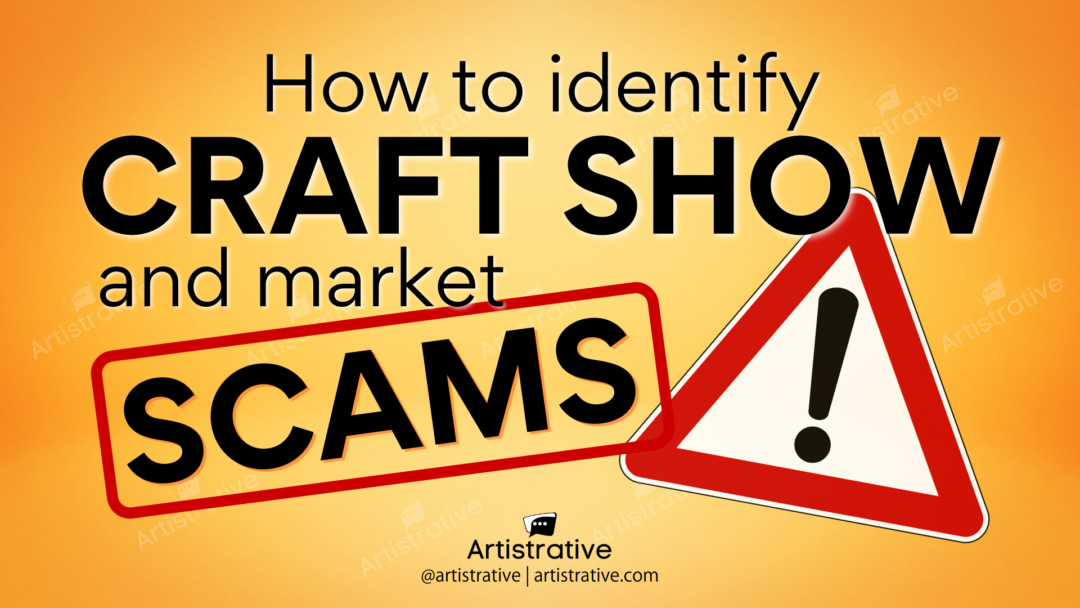The past couple of years has seen a dramatic increase in the number of craft shows or market scams being conducted on social media. Facebook is not the only arena where we see these kinds of scams taking place, but it is prevalent on that platform.
Reporting the fake profiles and trying to ensure fake event pages are removed isn’t always easy or successful. In my opinion, Facebook needs to treat these scams with the seriousness they deserve and work to deactivate these fake accounts expediently. However, until the platform improves its response to reports of these scammers the market community must come together to help each other to help ourselves.
So how do we spot the fakes?
There are several ways you can check the authenticity of a posted event before you send any money to participate, and ensure you do not fall for the scams.
One of the fastest and easiest ways to verify the legitimacy of an event is its public presence. Do they have a full-featured website, professional logo, official social media accounts, professional graphics and visible marketing? If the posted event has a long-standing reputation it is easy to visit their website and confirm if the event is taking place. You would expect to see the method of applying to the show listed on the show website as well as posts about the event on their official social media channels. Just make sure that a legitimate show is not being copied by a scammer. Visit the show’s official pages to send your application and payment.
But what if the event is not a large production and it does not have a website, logo and official pages? Don’t worry, there are many other ways to confirm even the smallest event.
Tell-tale signs of a show scammer and fake events.
When did they join the group?
When you see someone posting about an event in a Facebook group claiming they are running an event and asking for people to sign up (and pay) to attend first check to see how long they’ve been in that group. Many times they have joined the group the same day they made the post. That is a warning sign. However, keep in mind there are real humans behind these scams who change and adapt their methods based on what we continually learn about them. For example, some of the savviest scammers may join a group under several profiles and not post anything for several months. That way when they do post their scam they’re not posting the same day they joined the group.
Check their profile.
Often you’ll see the scammer profile has no friends and no activity. Maybe the profile is very new. However, scammers know that if their profile looks fake you are less likely to fall for their scam, and it is more likely Facebook will remove them if they are reported. To help combat this scammers will work to make their profile look legitimate. They will typically steal a complete profile (using the victim’s name and photos) or make up a name and just steal someone’s photos of their profile, children, holiday, etc and they’ll post some of these on their page at different intervals specifically to appear legitimate. Some will go as far as to have visible interaction on their profile – which is just the scammer commenting on one fake profile from another. Look carefully and you should spot the sure signs of this fake interaction.
Ask Them Questions.
Another good indication is when you ask questions but they want you to message them privately. They usually do not want to answer questions publicly. They prefer to communicate one-on-one. However, they are getting smarter about this and they will sometimes answer basic questions in an attempt to look legitimate. Usually, though they will always try and steer you to a private message and avoid detailed responses in public.
How Do You Apply?
Most times there is no formal application, you are just told to “message me for application”. They may send you some type of application form, but don’t give them your details unless you know they are legitimate! If they do have an application form, why do you have to message them to get it. A legitimate event would just make it available, not insist on a private message via social media to obtain it.
Is it Urgent?
Those that are inviting direct sellers will often claim they will only accept one vendor for each direct sales (DS) company, they will tell you that your DS company spot has not yet been filled, but they have others who are interested. This is done to generate urgency so that you will send them money quickly to reserve that space before anyone else can.
Payment Methods.
The preferred method of payment for all scammers will generally be fast, easy, possibly irreversible, and not traceable back to the scammer. Depending on your location this could be any number of methods, but rest assured they are always going to request payment that you can not easily get back. Paypal ‘Friends and Family” is a popular choice, but not always what they use.
Graphic Quality.
When a post is accompanied by graphics it’s usually easy to see that they have stolen graphics from another event and made edits removing the location and date and typing in their fake location and date. Here’s an example of how this might look.

Notice that the text is not consistent and uses different fonts and sizes. Sometimes the quality of the graphic looks pixelated or unclear.
It Doesn’t Add Up!
Sometimes the scammer will post event details that simply do not add up. That’s not a surprise since they are not usually in the same country and have no real knowledge of the event venue. They choose their venue by searching online, they don’t research many details. It may be apparent there’s something wrong if the venue they’ve chosen doesn’t fit the other claims about the event. For example, a 10 x 10 booth, piped and draped, including tables and chairs, for a 3-day event with an expected shopper count of 10,000 for a fee of $50? Not likely! Or they claim their event will have 100 vendor tables but the venue could only fit 20.
Changing Tactics.
Many of these scams are posted in Facebook groups where show and market vendors are likely to gather. But as we become more aware of these scams group admins are better able to prevent or remove these posts from groups. So scammers are changing tactics and have taken to posting their fake events on legitimate show pages. If the page settings do not allow visitor posts the scammer will simply comment under legitimate posts that page has made. Scammers can post hundreds of such comments in minutes so it can be extremely difficult for any page administrator to keep up with, and remove those fake posts.
Another related scam is happening on legitimate event page listings. Scammers post links either falsely claiming the link is how you get tickets to that legitimate event, or to view a live stream of the show. Don’t click on those links (unless they are posted by the actual page owner of course). Those links posted by scammers are phishing links.
Still not sure? Ask the Venue.
You can of course call the listed venue to check if an event is scheduled to take place at their location. However, I would suggest this as a last resort. If it’s very obvious from all of the other warning signs that this is a scam, we don’t need to bother event venues with constant phone calls asking the same question.
Okay, so that’s a scam, now what?
If you identify a profile posting show scams, report the post and the profile to Facebook. You can also report the post to the page or group you see it posted on.
It’s always helpful if you identify a show scam to pass that knowledge on to your local network, market and show groups, and other contacts. Wherever you can reach others to help them identify and avoid the scam. If you have called the venue and verified the scam, be sure to let people know so others won’t need to make that same call and waste the time of the venue staff, after all, they are victims of the scam as well.
The best way to help stop these scammers is to make it less profitable for them. The more we help educate each other and alert others to these scams, the less money these scammers will make. When it is no longer profitable for them, they will move on.
FOLLOW ME on social media for more tips and information: FACEBOOK | INSTAGRAM
